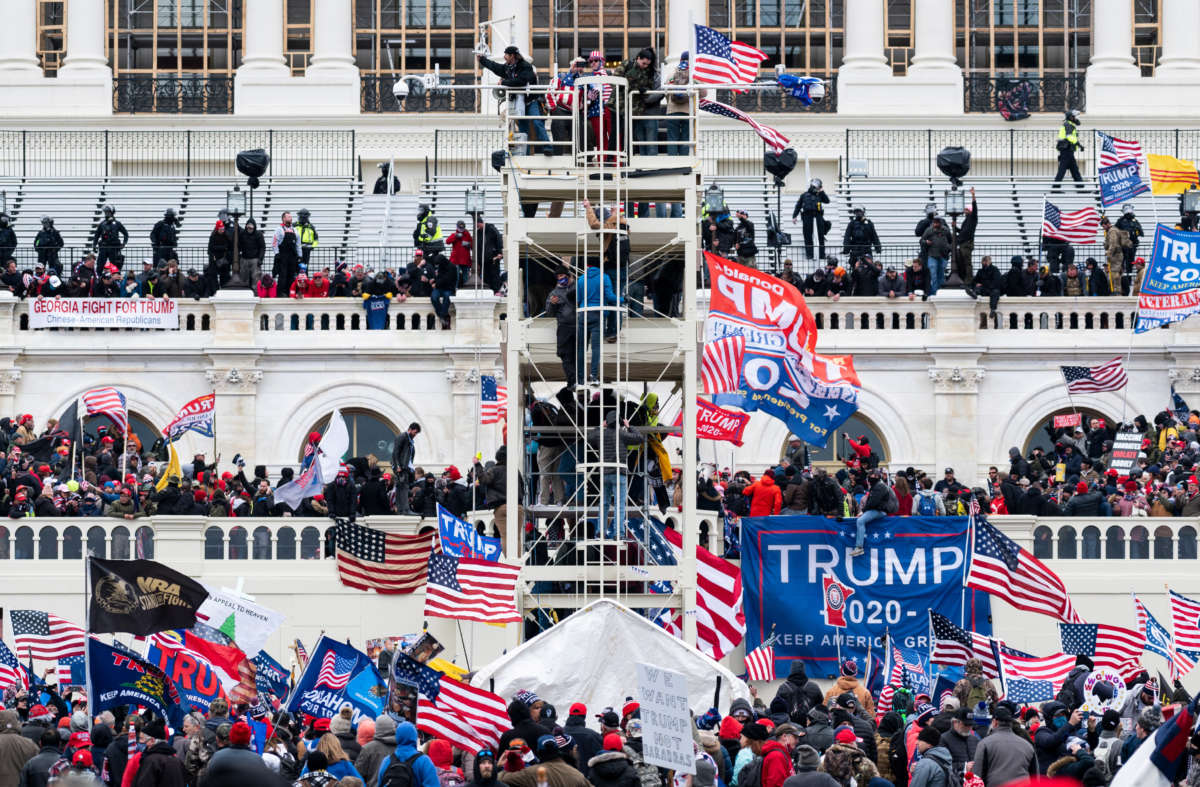Honest, paywall-free news is rare. Please support our boldly independent journalism with a donation of any size.
Nearly seven-in-ten Republicans falsely believe that “antifa” was part of the attacks on the U.S. Capitol last week, and that President Donald Trump, who instigated a crowd of his own supporters to breach the landmark building, bore little to no responsibility for what happened, according to a new poll out this week.
An Economist/YouGov poll released this week shows that only 37 percent of Americans overall believe antifa was involved in the event. Among Republican-leaning respondents, however, 69 percent wrongly say antifa took part, with only 9 percent correctly stating that the non-existent organization played a hand in it.
Among those who voted for Trump, endorsement of the errant theory is even more apparent, with 74 percent of the president’s supporters saying antifa was involved and only 5 percent saying they weren’t.
Rather than a formalized group, antifa is an informal ideological stance against fascism. Indeed, the term itself means “anti-fascist.” There is no national antifa organization, and many local groups across the country that have antifascist politics are not affiliated with one another.
Republicans and Trump supporters differ in opinion from the country overall on whether Trump, who called on his loyalists to go to the Capitol before the breach took place, is responsible in any way for the attacks. While 54 percent of Americans say Trump bears “a lot” or “some” responsibility for the storming of the Capitol building, only 20 percent of Trump supporters agree. Trump supporters are twice as likely as Americans overall to say that he bears “a little” or no responsibility whatsoever, with 72 percent of the president’s supporters saying as much.
Respondents in the poll were also asked to express their feelings about the Capitol breach last week. Sixty-two percent said they were “disappointed” in what they saw, while 51 percent said they were “angry” and 50 percent said they were “ashamed.”
Among Trump supporters, around the same amount (59 percent) said they, too, were “disappointed.” But only 33 percent said they were “angry” about what had transpired, and just 36 percent described themselves as “ashamed” over what the crowd of Trump loyalists had done.
The poll demonstrates that many Republicans and Trump supporters are still willing to believe falsehoods about the events of last week, particularly when it comes to who should be blamed. They are not the only ones — several conservative members of Congress, including Rep. Matt Gaetz (R-Florida), Rep. Mo Brooks (R-Alabama) and Rep. Louie Gohmert (R-Texas), have also peddled the same unsubstantiated idea that antifa was responsible for the attacks on the Capitol.
“Some of the people who breached the Capitol today were not Trump supporters,” Gaetz claimed on the floor of the House hours after the breach occurred. “They were masquerading as Trump supporters and in fact, were members of the violent terrorist group antifa.”
It’s possible that the Florida lawmaker may have gotten the idea due to faulty reporting from The Washington Times, which had wrongly reported that a facial recognition company identified antifa members. When that company challenged the reporting, saying it had not done such a scan, The Times deleted the story from its website.
The company in question, XRVision, did eventually perform an analysis, according to reporting from The Wrap. It did not find any individuals associated with antifa among those in the crowd, but did link two participants of the Capitol breach to known Nazi groups.Hundreds of individuals have since been identified as having taken part in the Capitol breach, including at least 28 cops and many well-known Trump supporters.
A terrifying moment. We appeal for your support.
In the last weeks, we have witnessed an authoritarian assault on communities in Minnesota and across the nation.
The need for truthful, grassroots reporting is urgent at this cataclysmic historical moment. Yet, Trump-aligned billionaires and other allies have taken over many legacy media outlets — the culmination of a decades-long campaign to place control of the narrative into the hands of the political right.
We refuse to let Trump’s blatant propaganda machine go unchecked. Untethered to corporate ownership or advertisers, Truthout remains fearless in our reporting and our determination to use journalism as a tool for justice.
But we need your help just to fund our basic expenses. Over 80 percent of Truthout’s funding comes from small individual donations from our community of readers, and over a third of our total budget is supported by recurring monthly donors.
Truthout has launched a fundraiser to add 500 new monthly donors in the next 10 days. Whether you can make a small monthly donation or a larger one-time gift, Truthout only works with your support.
